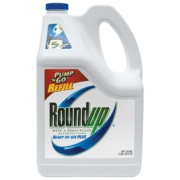 Consumers have reason to be concerned. The use of toxic chemicals is seriously on the rise. And their effects, although our federal “watchdog” agencies are officially touting them to be safe, look to be real cause for concern (to put it mildly).
Consumers have reason to be concerned. The use of toxic chemicals is seriously on the rise. And their effects, although our federal “watchdog” agencies are officially touting them to be safe, look to be real cause for concern (to put it mildly).
Here are a few stories that hit the news today. Judge for yourselves, then you might want to make some changes.
This first news story is on a peer-reviewed report, published last week in the scientific journal Entropy that details that heavy use of Roundup, the world’s most popular herbicide, could be linked to a range of health problems and diseases, including Parkinson’s, infertility and cancers.
 Environmentalists, consumer groups and plant scientists from several countries have warned that heavy use of glyphosate, the main ingredient in Roundup, is causing problems for plants, people and animals. Given that this herbicide is used on lawns, gardens, golf courses as well as being sprayed extensively over farm fields, it’s no wonder that scientists have discovered glyphosate in our food. Check out more on this story here.
Environmentalists, consumer groups and plant scientists from several countries have warned that heavy use of glyphosate, the main ingredient in Roundup, is causing problems for plants, people and animals. Given that this herbicide is used on lawns, gardens, golf courses as well as being sprayed extensively over farm fields, it’s no wonder that scientists have discovered glyphosate in our food. Check out more on this story here.
The next story features how U.S. Senators, in their wisdom, have introduced legislation to reduce regulations on pesticides. The new legislation would eliminate Clean Water Act permits required for certain applications of pesticides on or near waterways. You can read more on this here.
 The use of chemicals in our lives has a place. But shouldn’t our government and its so-called watchdog agency truly be looking into how safe these are and the scientific evidence that continues to accumulate as to the serious negative effects they’re producing on humans and wildlife? With all the talk about food security, one would think that the safety of our food supply would be critical, not simply an expediency that only rears its head after a disastrous outbreak of some kind that could have been prevented in the first place if proper oversight had been in place.
The use of chemicals in our lives has a place. But shouldn’t our government and its so-called watchdog agency truly be looking into how safe these are and the scientific evidence that continues to accumulate as to the serious negative effects they’re producing on humans and wildlife? With all the talk about food security, one would think that the safety of our food supply would be critical, not simply an expediency that only rears its head after a disastrous outbreak of some kind that could have been prevented in the first place if proper oversight had been in place.
But again, read the reports and decide for yourselves. The more informed we consumers are, hopefully the better choices we will make, particularly when it’s our health and that of our kids at stake.
Filed under: Health concerns, Uncategorized | Tagged: cancer, Clean Water Act, environment, environmentalists, federal watchdog, food security, glyphosate, health, herbicides, infertility, Parkinson's, Roundup, scientists, toxic chemicals |




Leave a comment